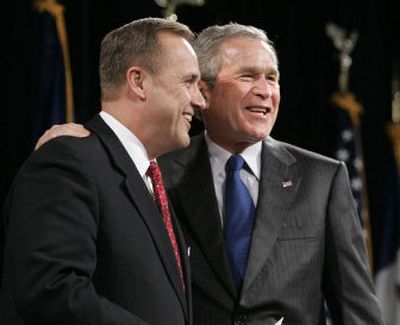President’s coattails unsure ride for GOP

DES MOINES, Iowa – For a politician, the moment would seem too good to miss.
Air Force One lands at your city’s airport, the president steps onto your hometown soil and the sleek trappings of the White House snap into place as you’re whisked away in a motorcade. All the while, local television cameras capture the moment.
Yet for President Bush, the ritual he has performed again and again is no longer such a simple act of showmanship. These days, in the face of persistently low approval ratings, some Republicans suddenly seem to be unavailable when the president comes to town.
In Ohio, Sen. Mike DeWine cited scheduling conflicts during three presidential visits this year. In Pennsylvania, Sen. Rick Santorum passed on the chance to publicly greet Bush last month. And in Illinois, Judy Baar Topinka stood by as an aide said the Topinka campaign would like the president to raise money in the governor’s race only “late at night, in an undisclosed location.”
Not all candidates are keeping their distance. There is, after all, a golden reason not to, as Rep. Jim Nussle, R-Iowa, discovered last week when Bush headlined the most lucrative fundraiser of the year in Nussle’s bid for governor. A one-on-one photo session with Bush, followed by a 20-minute presidential speech, netted nearly $1 million.
While Nussle was on hand to greet the president when he stepped onto the tarmac at the Des Moines International Airport on a balmy spring day, Bush wondered aloud whether he would be invited back when the political season turns to summer or fall.
“When Nussle came out to the airport, he said, ‘Fine, I’m glad to have you here this time of the year, but when we’re coming down the stretch, make sure you send the A-team,’ ” a smiling Bush later told guests at the fundraising dinner. “I said, ‘Which one, Mother or Laura?’ He said, ‘Both.’ “
The president’s reference to his mother and wife, designed to be self-deprecating, also carried a ring of truth.
Some six months before the midterm elections, the White House is entering uncharted ground: Bush is not a guaranteed asset on the campaign trail. For the first time since taking office, the president may be harmful to some Republicans locked in close races, where voters may already feel discontent over Iraq, the Medicare drug program or his stance on immigration.
So is Bush having a Bill Clinton problem?
During Clinton’s second term, Democrats seemed to perfect a delicate dance where they allowed him to raise money for their campaigns but shied away from appearing with their beleaguered president. Even in George H.W. Bush’s administration, Republican senators and governors frequently scattered when he came to town, fearful his low approval rating might be contagious.
“If you want the election to turn local, you don’t want anybody from outside coming in,” Gov. Haley Barbour of Mississippi, a former head of the Republican National Committee, said in an interview. “The president can come in and raise you a whole bunch of money, but (it can) cut against your message if you’re trying to have a local election.”
Indeed, Democrats are eager to nationalize the midterm elections, hoping to paint at-risk GOP candidates as a “rubber stamp” for the Bush administration. As Republicans fight to hold their majorities in the House and Senate, a key objective is to attempt to insulate candidates from any ill will or national mood swing against the president or his party.
It’s not just Bush. When Vice President Dick Cheney arrived in New Jersey last month for a fundraiser, Republican senate candidate Tom Kean Jr. arrived 15 minutes after Cheney’s motorcade departed. The excuse of congested roads didn’t wash with local traffic reporters, who suggested other routes could have gotten Kean to the event on time.
While Bush and Cheney remain popular in most Republican circles and many candidates or officeholders would be delighted to host them, there also are districts in some parts of the country where GOP political strategists are fashioning a backup plan to build upon a successful strategy from the 2004 campaign: Send Laura Bush.
“Is the first lady more popular in suburban districts and the Northeast? Yes,” said a senior Republican strategist close to the White House. “While the average donor in Cincinnati might have six pictures of the vice president, they may not have any of her and they’d be excited to see her.”
White House spokesman Scott McClellan dismissed suggestions that candidates were keeping their distance, noting that DeWine, the Ohio senator, was seated near Bush when he threw out the ceremonial first pitch on the Cincinnati Reds’ opening day. He said supply – the number of GOP events Bush is invited to – exceeds demand. “The president is getting requests on a daily basis,” McClellan said, “much like he has in the past.”
For all the consternation among some Republicans about how closely to navigate their races to the administration, a presidential visit remains irreplaceable, particularly for raising money. And it has been made known that even if candidates don’t want to appear in public with the president or vice president, the White House will still help raise money in competitive races.
Terry Nelson, the political director for the Bush campaign in 2004 who is now a strategist in several congressional races, said he believed candidates who attempted to distance themselves from Bush were making a tactical error. “If the president is going to hurt Republican candidates, he’s going to do that,” Nelson said. “Not standing on a stage with him isn’t going to change things.”
Earlier last week, after word spread that Topinka wasn’t eager to be seen with Bush, she placed a call to the White House and personally invited the president to campaign with her. A Republican strategist close to the White House said her request would be “added to the long list.”